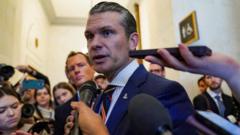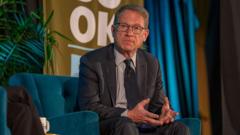Donald Trump's nominees for top positions are under scrutiny as they prepare for confirmation hearings in the Senate. The nominees, including Pete Hegseth for Defense Secretary and Kristi Noem for Homeland Security Secretary, face challenging questions regarding their backgrounds, past controversies, and alignment with Trump's policies.
The Crossfire: Trump Nominees Brace for Senate Confirmation Hearings

The Crossfire: Trump Nominees Brace for Senate Confirmation Hearings
As the confirmation hearings for Donald Trump's nominees unfold, key questions arise about their qualifications, controversies, and the political landscape shaping their approval.
The confirmation process for Donald Trump's nominees is entering a critical phase, with several key allies poised for extensive questioning in the Senate. As the hearings commence, senators will have the opportunity to examine the credentials and actions of Trump's controversial nominees. Although the Republican Party controls the chamber, even a few defections could obstruct appointments.
Among the nominees, Pete Hegseth for Defense Secretary may attract significant attention due to his lack of management experience and prior allegations of misconduct, including a 2017 sexual assault accusation, which he denies. The scrutiny over Hegseth's suitability stems from concerns regarding his military views and personal conduct, including past claims questioning women's roles in combat.
On Wednesday, Kristi Noem, nominated for Homeland Security Secretary, will likely be queried about the logistics of Trump's aggressive immigration policies, including mass deportation proposals and plans to end birthright citizenship. Experts are wary of the legal and operational challenges such plans could present, raising crucial insights into the administration's immigration strategy.
Marco Rubio's potential confirmation as Secretary of State is expected to be less contentious, although senators could challenge his loyalty regarding U.S. support for Ukraine amid Trump's criticisms of involvement in the conflict. This evolution from past rival to ally highlights a shift in political dynamics that could influence his confirmation process.
Howard Lutnick, chosen as Commerce Secretary, may face questions on the economic consequences of Trump's proposed tariffs on imports. His support for these tariffs, despite opposition from parts of the business community, paints a picture of the varied economic agendas within the new administration.
Tulsi Gabbard's nomination for National Intelligence Director may lead to probing discussions of her controversial stances on U.S. foreign policy, particularly regarding Russia and Syria. Her history of questioning established intelligence community assessments places her in a precarious position amid heightened geopolitical tensions.
Robert F. Kennedy Jr.'s appointment as Health and Human Services Secretary faces skepticism, especially due to his lack of medical credentials and controversial statements on vaccines, while Kash Patel's nomination to lead the FBI raises concerns around his suitability to oversee the agency amidst a backdrop of partisan conflicts.
As the hearings progress, the nominees must navigate a complex array of questions that probe both their qualifications and their alignments with Trump's broader political and ideological goals. The outcome of these confirmations could significantly shape the direction of the incoming administration, highlighting the intricate interplay between politics, policy, and personnel choices.






















